Demi Moore leaps ahead in Oscar race after Globes win
Watch: Best moments from the 2025 Golden Globes
- Published
Demi Moore has made a triumphant return to the Golden Globes, winning best actress for a role in a body horror which has revitalised her career.
The 62-year-old gave an impassioned speech as she collected her award, telling the audience she was "at a low point" before being cast in The Substance.
Moore said the award was a celebration of "the gift of doing something I love and being reminded that I do belong".
Other film winners included Emilia Pérez, The Brutalist and Wicked, while Baby Reindeer and Shōgun won the big TV prizes.
The Golden Globes, the first major ceremony of awards season, are considered to be a strong measure of which films have momentum ahead of the Oscars.
One of the night's big surprises was Brazilian actress Fernanda Torres winning best drama actress for her tremendous performance in I'm Still Here, which held off competition from Hollywood A-listers Angelina Jolie and Nicole Kidman.
Unlike the Oscars, the Golden Globes split many of their film categories in two, with prizes for dramas and musicals/comedies. Moore won best actress in a musical or comedy.
'Popcorn actress'
Moore was a fixture at the Globes in the 1990s and 2000s, but has only won an award for the first time this year. The Substance sees her play a woman who trades her body for a younger, more beautiful version of herself.
Moore said she was "in shock" after winning in such a competitive category, which also included Anora star Mikey Madison, Wicked's Cynthia Erivo, and Emilia Pérez star Karla Sofía Gascón.
"I've been doing this a long time, over 45 years, and this is the first time I've ever won anything as an actor," Moore said.
"Thirty years ago, I had a producer tell me that I was a popcorn actress and at that time, I made that mean that [awards] weren't something that I was allowed to have, that I could do movies that were successful, that made a lot of money, but that I couldn't be acknowledged.
"I bought in, and I believed that, and that corroded me over time, to the point where I thought a few years ago that maybe this was it, maybe I was complete. I've done what I was supposed to do.
"And as I was at kind of a low point, I had this magical, bold, courageous, out-of-the-box, absolutely bonkers script come across my desk called The Substance, and the universe told me that you're not done."
Emilia prevails
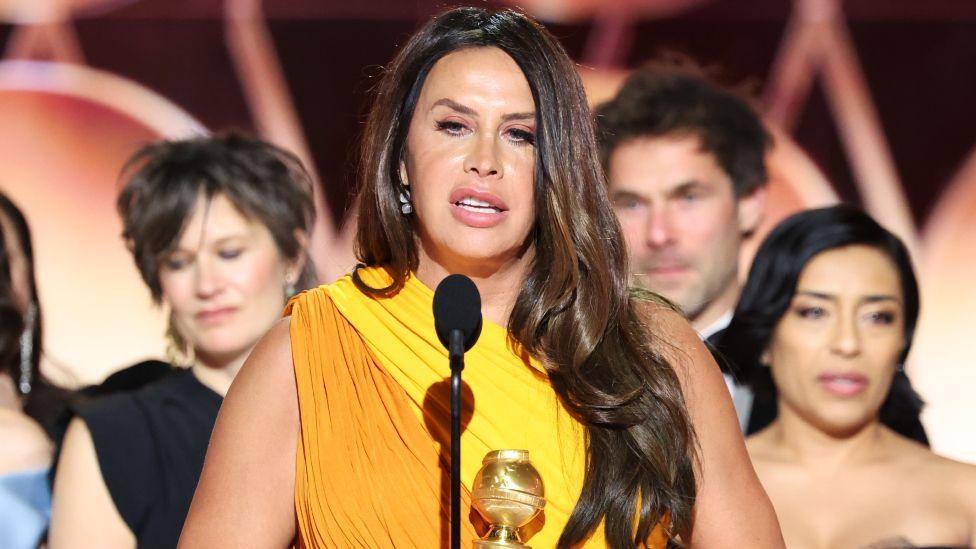
Emilia Pérez star Karla Sofía Gascón accepted the prize for best musical or comedy film
Elsewhere, Emilia Pérez, a Spanish-language musical about a Mexican drug lord who changes gender, won four awards, making it the top film winner.
Accepting the prize for best musical or comedy film, trans actress Karla Sofía Gascón told the audience: "I want to say to you, raise your voice, and say, 'I am who I am, not who you want'."
Her co-star Zoe Saldaña was named best supporting actress, telling the crowd in an energetic acceptance speech that her "heart is full of gratitude".
"I'm so blessed to be sharing this moment with my fellow nominees," she said. "I know this is a competition but all I have witnessed is just us showing up for each other and celebrating each other and it's just so beautiful."
Her win puts Saldaña in a strong position in one of the most crowded categories at this year's Oscars.
The film also won best original song and best non-English language film. Accepting the latter prize, director Jacques Audiard said: "In these troubled times I hope Emilia Perez will be a beacon of light."
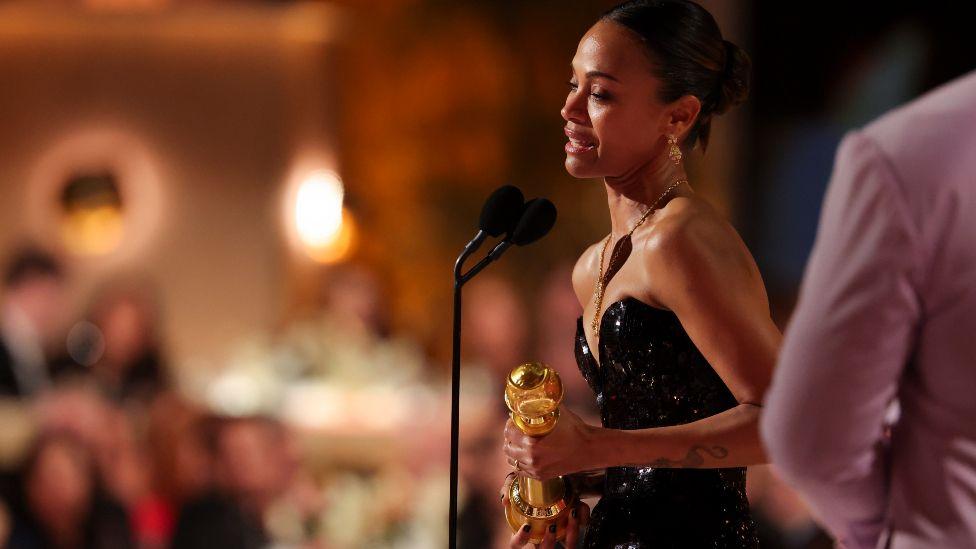
Saldaña gave an emotional speech as she accepted the award for best supporting actress
The Brutalist, an epic movie about a Hungarian architect who builds a new life in the US after World War Two, won three prizes, including best drama and best actor for Adrien Brody.
Brady Corbet was named best director, and acknowledged in his acceptance speech that the film was not a traditional box office proposition.
"Nobody was asking for a three-and-a-half hour film about a mid-century designer," he joked.
"I was told that this film was un-distributable, that no-one would come out and see it, that the film wouldn't work, and I don't resent that.
"But I want to use this as an opportunity to lift up filmmakers... Films don't exist without the filmmakers. Please let's support the filmmakers, let's prop them up."
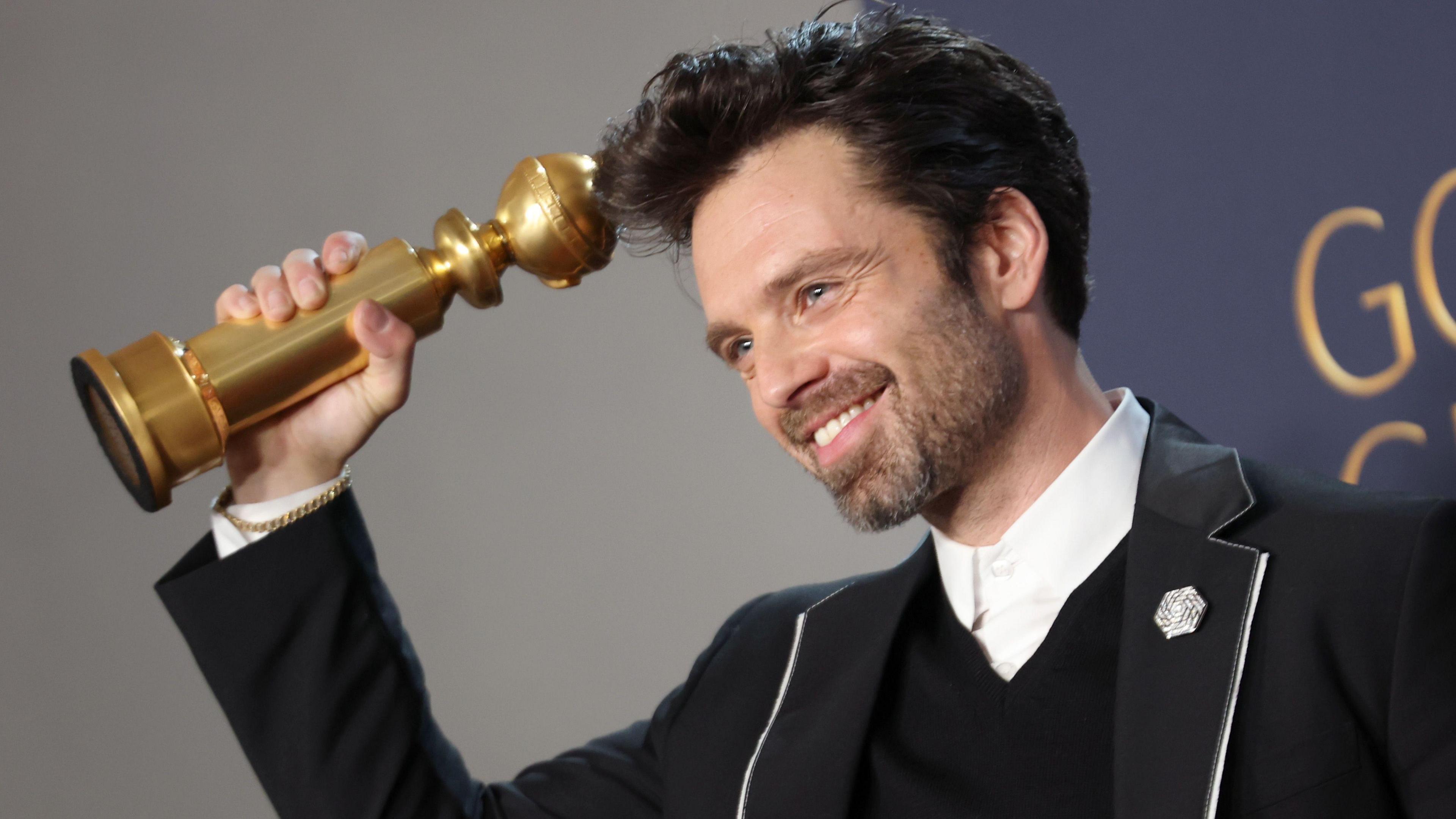
Sebastian Stan, who had two Globe nominations, won for his performance in A Different Man
Sebastian Stan was named best actor in a musical or comedy for A Different Man, which sees him play a character with a disfiguring facial condition who drastically changes his appearance.
"Our ignorance and discomfort around disability and disfigurement has to end now, we have to normalise it and continue to expose ourselves to it, and our children, encourage acceptance," he said in his speech.
Kieran Culkin held off competition from his Succession co-star Jeremy Strong to win best supporting actor for his performance in A Real Pain, about two cousins who travel across Poland in memory of their grandmother.
"The first ever acknowledgement I got as an actor was a Golden Globe nomination when I was basically a kid," Culkin recalled. "Now, it's like the best date night my wife and I ever have."
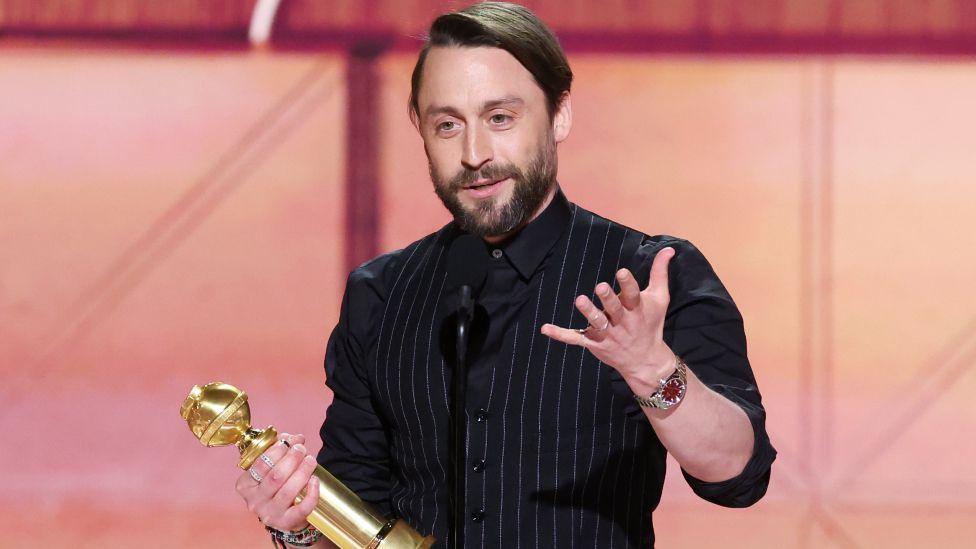
Culkin was named best supporting actor for his performance in A Real Pain
Wicked missed out on the major categories, but took home the box office achievement prize. It follows in the footsteps of Barbie, which was also heavily nominated but only took home the box office award last year.
Accepting the prize, Wicked's director Jon M Chu paid tribute to the loyal fanbase of the film and stage musical, which tells the origin story of Elphaba, the Wicked Witch of the West.
"This is for you, the fans out there, who came to the movie theatres, brought your friends and family, we saw your videos, your singalongs, your make-up, hair products, bakery items," he said.
"It shows us how important making this stuff is, in a time when pessimism and cynicism rule the planet, that we can still make art that is a radical act of optimism."
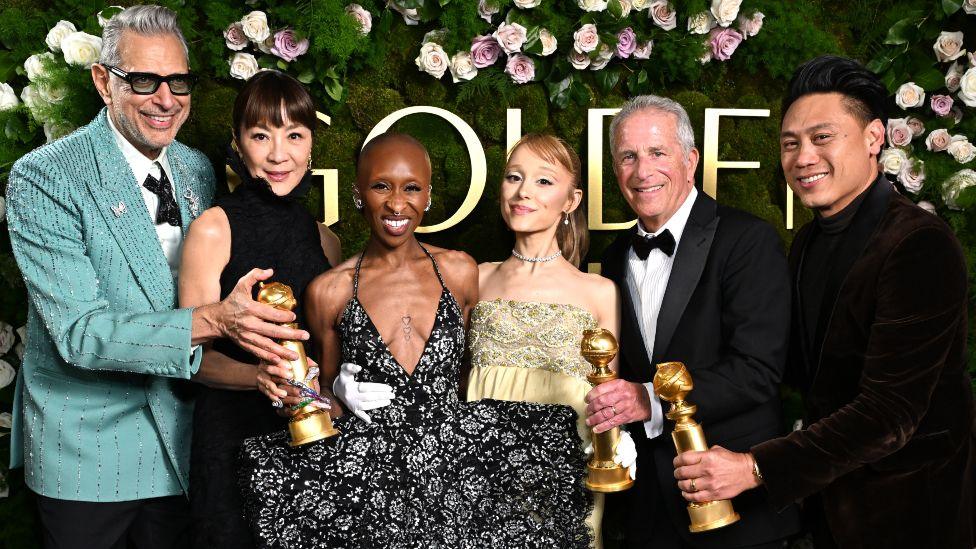
Wicked won the box office and cinematic achievement prize, which was introduced last year
There was a surprise but welcome winner in the animated feature category, which saw box office juggernauts The Wild Robot and Inside Out 2 beaten by Flow, a film about animals who must work together to survive following a flood.
"This film was made by a very small, young, but passionate team, in a place where there isn't a big film industry, so this is the first time a film from Latvia has been here so this is huge for us," said director Gints Zilbalodis.
Meanwhile, Torres became the first Brazilian actress to win the award for best drama actress, an award which her mother, Fernanda Montenegro, was also nominated for in 1999.
"This is such an amazing year for female performances," Torres said. "I want to dedicate this to my mother - she was here 25 years ago, and this is proof that art can endure through life."
Set in the 1970s, I'm Still Here follows a woman who investigates the disappearance of her husband, a Brazillian congressman.
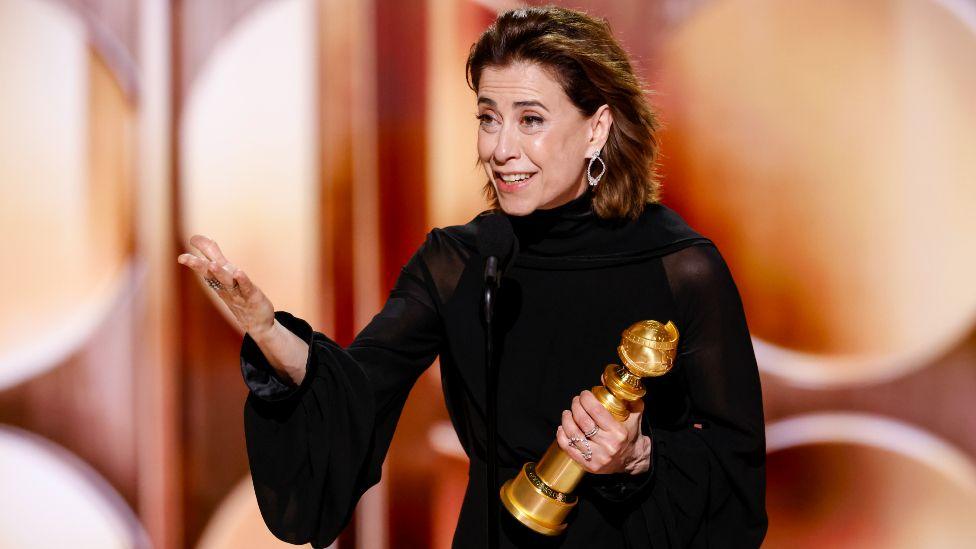
Fernanda Torres won best drama actress 25 years after her mother was nominated in the same category
Shōgun, a series set in 17th century Japan, was the big winner the TV categories. It took home four prizes including best drama series, repeating the success it had at last year's Emmy Awards.
Other TV winners included The Bear's Jeremy Allen White, True Detective's Jodie Foster, and Hacks star Jean Smart.
Baby Reindeer was named best limited series, which was accepted by its writer and creator Richard Gadd.
"A lot of people ask me why a show this dark has gone on to be the success that it has," he said. "And I think in a lot of ways, people were crying out for something that spoke to the painful inconsistencies of being human.
"For a while there's been this belief in television that stories which are too dark and complicated won't sell and no-one will watch them, so I hope Baby Reindeer has done away with that theory, because right now, when the world's in the state that it's in and people are really struggling, we need stories which speak to the complicated and difficult nature of our times."
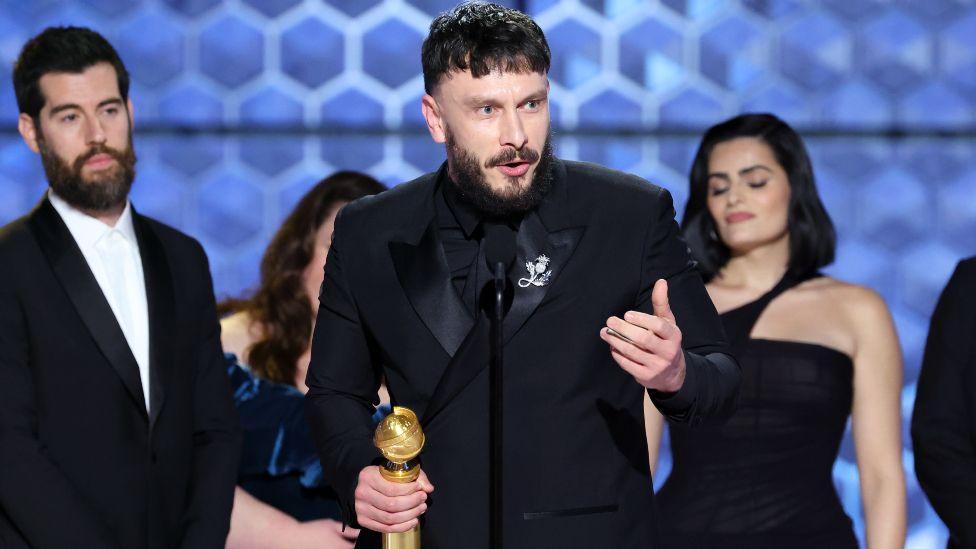
Baby Reindeer's Scottish writer and creator Richard Gadd accepted the prize for best limited TV series
Jessica Gunning, Gadd's co-star, was named best TV supporting actress for her portrayal as a stalker in the Netflix series.
In her acceptance speech, Gunning shared an anecdote about getting a hamster for Christmas as a child, and thinking that she couldn't believe it was happening to her. She said that phrase had become the "soundtrack of my life this year".
"Thank you to Richard Gadd, Baby Reindeer has changed my life in ways that I can't even explain. I can't believe this is happening to me," she repeated, "and I know that eight-year-old me wouldn't either, she'd be chuffed to bits."
Irish actor Colin Farrell won his third Golden Globe, for playing the Batman villain the Penguin in an HBO series of the same name.
On stage, he joked that he had "no one to thank" and "did it all by myself".
Recalling the three hours it took to fit him with prosthetics to make him the bloated villain in his latest film, he said: "In the morning, I drank black coffee, listened to 80s music, and I became a canvas for that team's brilliance."
Farrell also said: "Thank you for employing me. And yeah, I guess it's prosthetics from here on out."
Related topics
- Published6 January
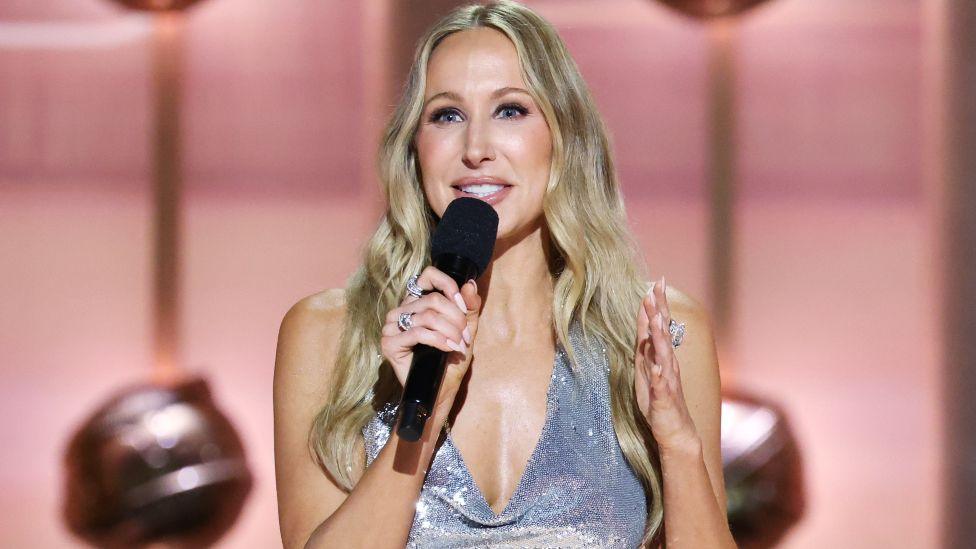
- Published6 January
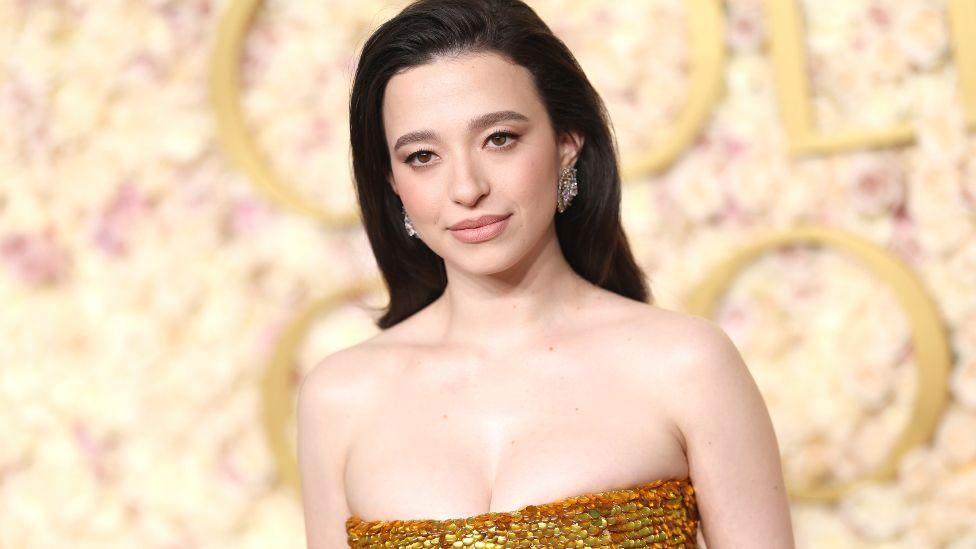
- Published6 January
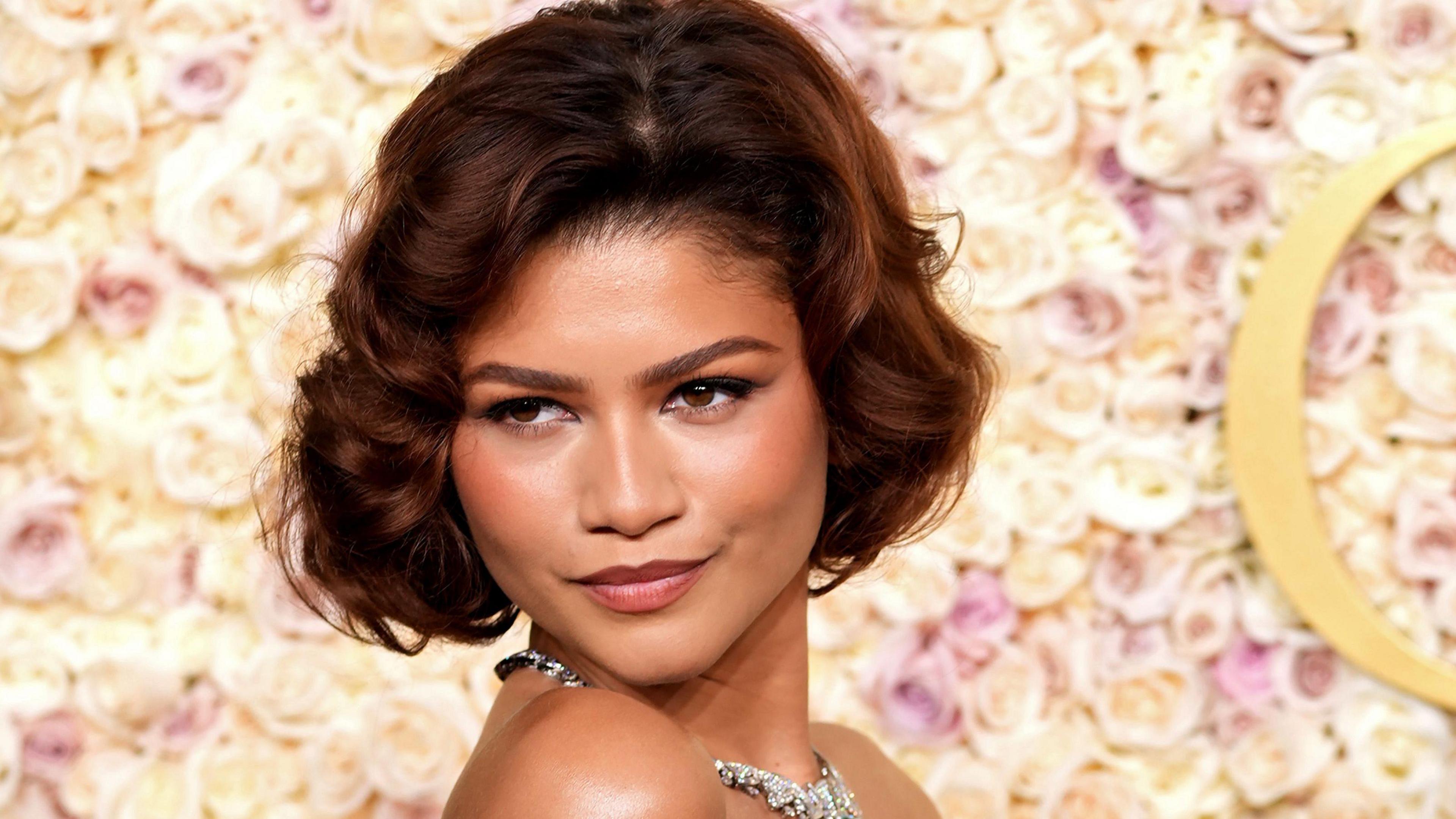
- Published6 January
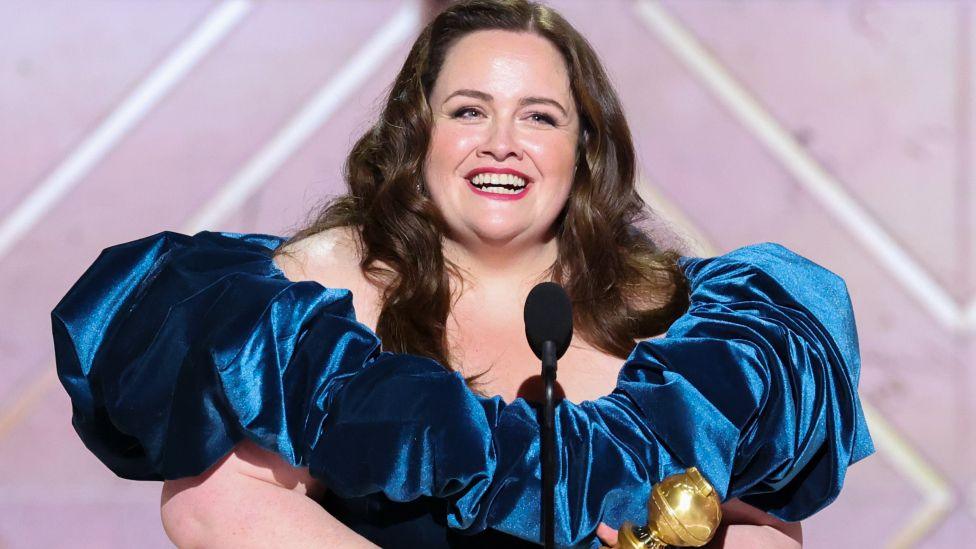
- Published3 March
